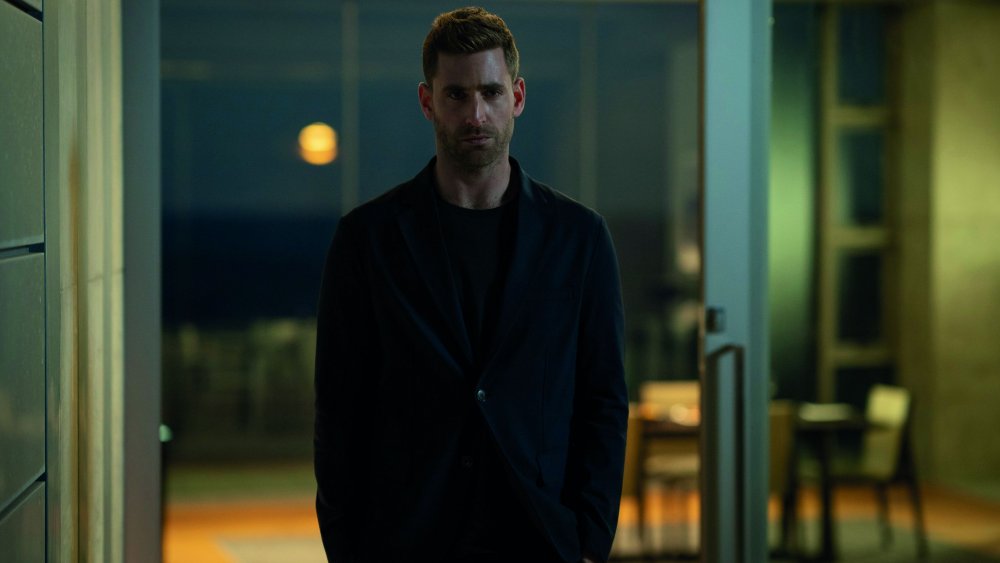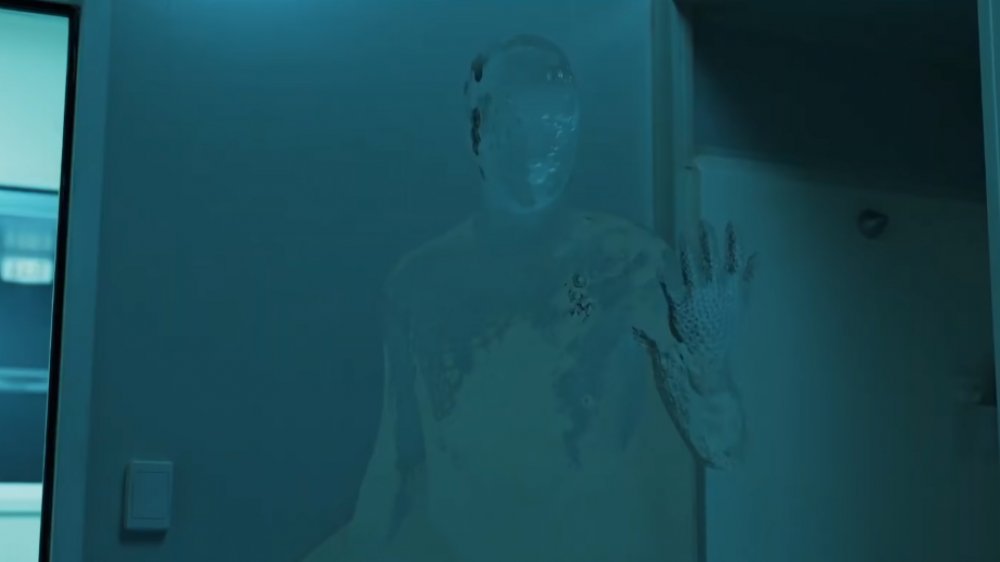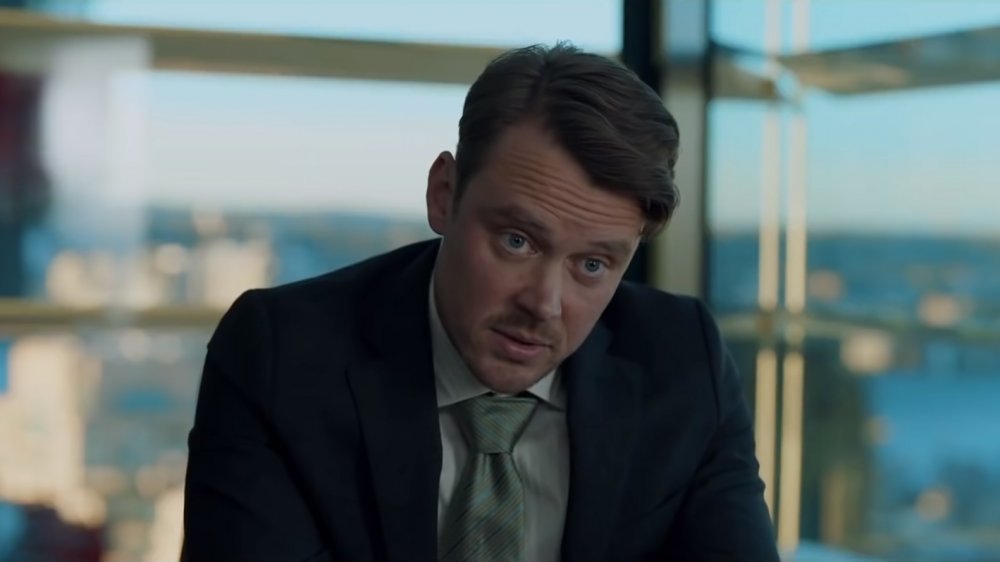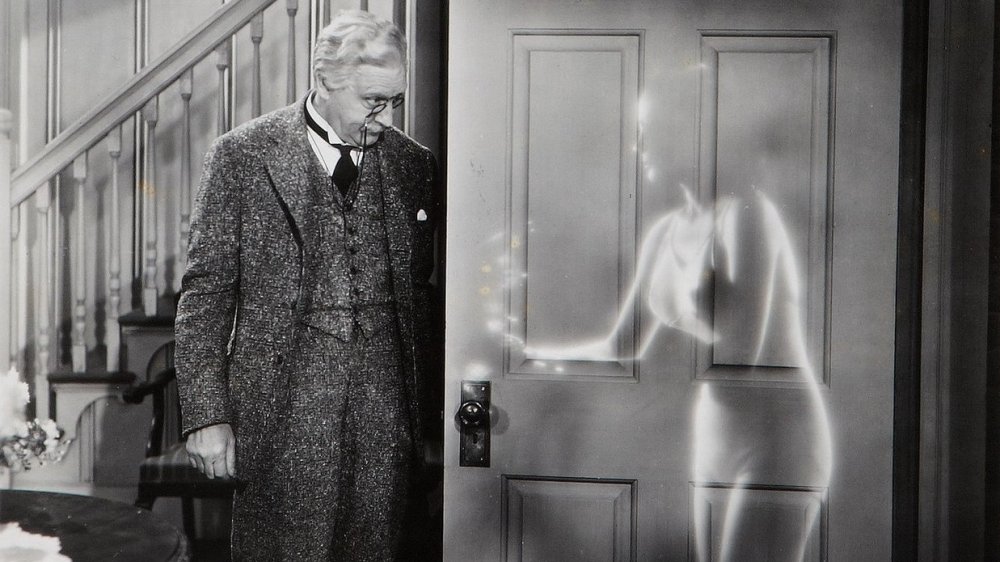The End Of The Invisible Man Explained
Stop now if you don't want anything about Universal's newest fright fest spoiled for you.
By the end of Leigh Whannell's The Invisible Man, most of the major plot threads have been resolved. After suffering through weeks filled with physical and mental abuse, Cecilia Kass (Elisabeth Moss) has cleared her name and proven to the world that she's not crazy — there really was an invisible man tormenting her. The technology used to render Cecilia's attacker invisible has been destroyed. The police have closed their case, even if they've probably fingered the wrong guy.
But there's still one thing left to do. Cecilia still has to meet her abusive ex, Adrian Griffin, face-to-face. This time, there's nothing between them. Not a car window. Not an invisibility suit. It's just Cecilia, Adrian, a dining room table, and a whole lot of nasty history.
It's the moment The Invisible Man has been building to the entire time, and like the rest of the film, it doesn't disappoint. No, the ending of The Invisible Man doesn't unfold exactly how you expect, but ironically enough, that's to be expected from Whannell's twisty horror-thriller. The Invisible Man's ending isn't a straightforward one, but it's the right one for the movie. Here's how it goes down.
Mr. Invisible Man, I gave you all of the clues
The Invisible Man's final showdown seems simple. Cecilia visits Adrian's house for a meal. As she eats, she demands an apology. Adrian refuses to give one, or even admit that he, and not his brother Tom, was behind Cecilia's torture. Cecilia breaks into tears, then leaves to freshen up. While she's gone, Adrian lifts a knife — seemingly against his will, even though he's alone in the room — and slits his own throat. Cecilia returns just in time to watch him die.
Everything Cecilia does in this scene is set up earlier in the movie. The security cameras that Adrian used to spy on Cecilia, and which appear in the movie's very first sequence, are now the key to proving his "suicide." Adrian's sudden throat-slitting looks almost exactly like Cecilia's sister's murder, and besides, throughout the film Adrian's weapon of choice is a knife. It's only fitting that his story ends with one.
And then, of course, there's the second invisibility suit that Cecilia dons in order to make Adrian's death look self-inflicted. You remember that, right? The one she found while snooping around the mansion earlier, then tucked away in a hiding space only she knows about? That's why Adrian's comeuppance is so satisfying: In the final scene, Cecilia is using all of Adrian's tricks against him. She even sends Adrian to the grave with his own catchphrase. "Surprise," indeed.
Once an abuser, always an abuser
During the meal, Adrian pleads for forgiveness. He wasn't the Invisible Man, he says, but he was wrong before that. He has learned his lesson. It won't happen again. He's very, very sorry.
Is he, though? Because actions speak louder than words, and everything that Adrian does in this scene screams that he hasn't changed at all. He might've ordered too much takeout, but in the end, he's still choosing Cecilia's meals for her (ultimately, he decides that she's not hungry at all — to which she defiantly responds with a steak). By blaming his brother for the Invisible Man's behavior and denying all wrongdoing, he's still trying to gaslight her. He blames Cecilia for her own trauma, deflecting responsibility and painting himself as the real victim.
This is all textbook behavior for an abuser, and it's not any different than what Adrian was doing while he was in the invisibility suit. From all indications, Adrian hasn't learned a thing. Thankfully, Cecilia doesn't fall for it. She's moved beyond Adrian, and she's not looking back.
But did Adrian really do it?
Of course, The Invisible Man's final scene does introduce another reading. Maybe Adrian is telling the truth. Maybe Tom was the Invisible Man the whole time. Maybe Cecilia has pegged the wrong dude. Maybe Adrian doesn't actually deserve to die.
Or maybe not. When you gather all of the evidence, it's pretty clear that Adrian was no good whether he was wearing an invisibility suit or not. He wasn't invisible when he shattered Emily's car window in a fit of rage. He wasn't invisible when he switched out Cecilia's birth control pills for placebos, trying to get her pregnant against her will. He's an established abuser with a history of lying. Everything that the Invisible Man does fits Adrian's MO — there's absolutely no reason to believe him.
Don't forget about the meds, either. While fleeing from Adrian, Cecilia drops the pills she used to drug him during her escape. We see Adrian picks them up. Later, the same blood-stained bottle is used to sabotage Cecilia's job interview, and to taunt her in the aftermath. The way that the film is shot implies that very few people know the pills' significance, and Adrian is one of them. Either he drugged Cecilia or he gave the bottle to the person who did. Either way, that makes him guilty.
One down, plenty of others to go
Ultimately, Cecilia might've freed herself from Adrian, but the former tech genius isn't the only guilty party. In The Invisible Man, Cecilia is constantly subjected to the whims of toxic masculinity. Adrian might've been the worst, but he's not the only one.
In fact, not a single male character in The Invisible Man escapes completely innocent. The good-natured architect can't help but make a couple of passes at Cecilia during her job interview. James' fellow police officer dismisses Cecilia's concerns immediately, the vibe being that women be crazy, right? Even before he's revealed to be part of Adrian's plot, Tom is patronizing and condescending.
Don't let James off of the hook, either. While James means well, he's not entirely sympathetic to the extent of Cecilia's trauma — only a couple of weeks after she leaves Adrian, both James and Cecilia's sister, Emily, push her well past her comfort zone. He expects her to be better instantly, but trauma recovery doesn't work like that. By dispatching the Invisible Man, Cecilia has treated a symptom. Unfortunately, the real problem is much, much bigger.
Sure, Cecilia won — but at what cost?
The Invisible Man is framed like an empowerment story. At the beginning of the movie, Cecilia lives in fear of Adrian. Even after she escapes, she's so traumatized that she can't even leave the house. Adrian's death gives her solace, but it's only once the Invisible Man begins attacking that Cecilia finally musters the courage, resolve, and confidence that she needs to fight back. By the end of the movie, Cecilia and Adrian have switched places. Cecilia is now the hunter. Adrian is her prey.
That's one way to look at it, anyway. Another is that, despite losing his life, Adrian won. The Cecilia we met near the beginning of the film — the kind, compassionate woman who buys James a new ladder and invests a significant portion of her newfound wealth into Sydney's college fund — is gone. Her sister is dead. She has blood on her hands. Her emotions have been replaced by a calm, cool detachedness, and she has no qualms about making James an unwitting accomplice to Adrian's death.
It goes even further than that, though. As we've seen, Cecilia has learned how to use all of Adrian's tricks. Like Adrian, she uses the invisibility suit to get away with murder. She is, for all intents and purposes, the new Invisible Man. That's not to say that she's the same as Adrian — Cecilia's ex is still much, much worse — but Adrian obviously broke Cecilia, and it's not clear if she'll ever truly recover.
Show me the money
As a thriller, The Invisible Man is taut and well-paced, but as a result it doesn't always take the time to explain everything, meaning a few unanswered questions remain once the credits start to roll. Most notably, Cecilia's big $5 million payout — a key piece of Adrian's plan to torment Cecilia, and one of the key drivers of the plot — isn't mentioned in the last bit of the movie. Presumably, Adrian's will still applies the second time he dies, but we'll never know for sure if Sydney ends up with enough cash to go to her dream college.
Same goes for how Adrian faked his death the first time — presumably, the deception was convincing enough to fool the police. Cecilia's revenge doesn't quite hold up if you think about it, either. The authorities know that Cecilia and Adrian have been mixed up with an invisibility suit, which was used to commit a murder. Adrian has already been the victim of one fake suicide. Even with the seemingly definitive camera footage and James' testimony, there's going to be a pretty thorough investigation, and Cecilia is sure to be a prime suspect.
Maybe that's why Cecilia takes off after making the 911 call. Still, while none of these loose threads really matter as far as The Invisible Man's main story are concerned, they're proof that the movie's tidy ending isn't quite as slick as it seems.
Where does the Invisible Man go from here?
Leigh Whannell's The Invisible Man doesn't need a sequel. By the end, Cecilia and Adrian's stories are complete. There's not much left to say about either of them. This is Hollywood, though, and if The Invisible Man is a hit, it's hard to imagine that Sony and Blumhouse won't try to build a franchise out of it.
It's happened before. In an interview, Whannell told Looper that the only other Invisible Man material he consumed before writing the 2020 reboot was H. G. Wells' original novel and James Whale's 1933 feature film, the latter of which received a number of sequels. In 1940's The Invisible Man Returns, the invisibility serum is used to clear a prisoner of a crime he didn't commit. In Invisible Agent, the Invisible Man's grandson gets into the family business to fight Nazis. The Invisible Man's Revenge goes back to the series' horror roots and tells the story of a crazed man's attempts to get revenge on the family who wronged him.
None of those really follow the plot established in 2020's The Invisible Man, but the idea of someone else getting their hands on the invisibility technology and embarking on a whole new adventure could be the way forward. Definitely don't expect a straight-up remake of The Invisible Woman, even though that seems like the most obvious direction to go. The 1940 feature is actually a screwball comedy in which a former model uses invisibility to stop some idiot gangsters. A follow-up to a moody, paranoid thriller it ain't.
Ignore the other Invisible Women
Of course, there's already an Invisible Woman feature film in development at Universal, but don't be fooled. This isn't a second act for Elisabeth Moss' Cecilia Kass. It's an entirely different project.
Actually, it's two. Way back in 2008, Matt Reeves — director of Cloverfield, the two most recent Planet of the Apes outings, and Warner Bros./DC's upcoming The Batman — wrote a script called The Invisible Woman that Variety described as "a Hitchcock-style thriller that probes the mind of a former beauty queen who turns to a life of crime to protect her family." According to a 2015 script review, it doesn't actually feature any invisibility. It's a simple crime caper. Allegedly, Reeves still wants to make the movie, but between Reeves' busy schedule and how long the film's been in development hell, that doesn't seem likely.
The more recent project comes from Elizabeth Banks, who's set to direct and star in a more traditional Invisible Woman remake for Universal. The Hollywood Reporter says that one, which was written by The Girl on the Train's Erin Cressida Wilson, is like "Thelma & Louise meets American Psycho." Banks' film is another attempt by Universal to revitalize its classic horror properties after Tom Cruise's The Mummy sunk the studio's planned Dark Universe franchise right out of the gate, but it's not a follow-up to Whannell's movie.
Still, if you're hankering for more invisible mischief-makers, it looks like Universal has you covered. And in the meantime, there's plenty more great horror on the way in 2020.








